
In Joker: Folie à Deux, the titular alter ego of failed comedian Arthur Fleck (Joaquin Phoenix) and the enigmatic Lee Quinzel (Lady Gaga) develop a dangerous bond as inmates in the notorious Arkham State Hospital, a bond they express through elaborate song and dance numbers. (“Folie à deux” refers to a medical term for a shared psychosis.) But are these fantastical, often foreboding musical sequences just in Arthur’s head, or somehow a deeper connection between the two? That’s up to audiences to decide. Behind the scenes, though, dance parties regularly went down in Gaga’s costume, hair and makeup trailer, which even had a nickname.
“‘Camp Lee’ was fantastic,” says Arianne Phillips. “It was so much fun.”
From pre-production through filming, the three-time Oscar-nominated costume designer meticulously plotted Lee’s journey, along with Gaga (whom Phillips refers to by the star’s birth name, Stefani), Frederic Aspiras (Gaga’s hairstylist) and makeup artist Sarah Tanno. The team took the character from an inpatient at the bleak psychiatric facility to her bold self-actualization as mercurial antihero Harley Quinn.
“What’s unique about Stefani is that she really understands costume, hair, and makeup — and she understands character,” says Phillips, who took over as costume designer from Joker’s Mark Bridges (who received an Oscar nod for that film).
The sequel is set in the early 1980s, and the costume aesthetic emphasizes a grimy, gritty realism. Phillips took inspiration from authentic sources, from ‘70s downtown New York City hallmarks to the golden age of Hollywood to Lady Gaga herself.
“She was really honest and very generous with sharing some of her own personal experience that she felt related to Lee, and that those were really morsels that I could take in,” says Phillips. She keeps the actual details close to her vest, simply sharing: “You can see it throughout the whole film.”
Ahead, Phillips discusses Lee’s custom-designed wardrobe evolution through three different worlds: Arkham, the courtroom, and a fantastical wedding.
Lee’s “Cozy Sweaters” At Arkham State Hospital
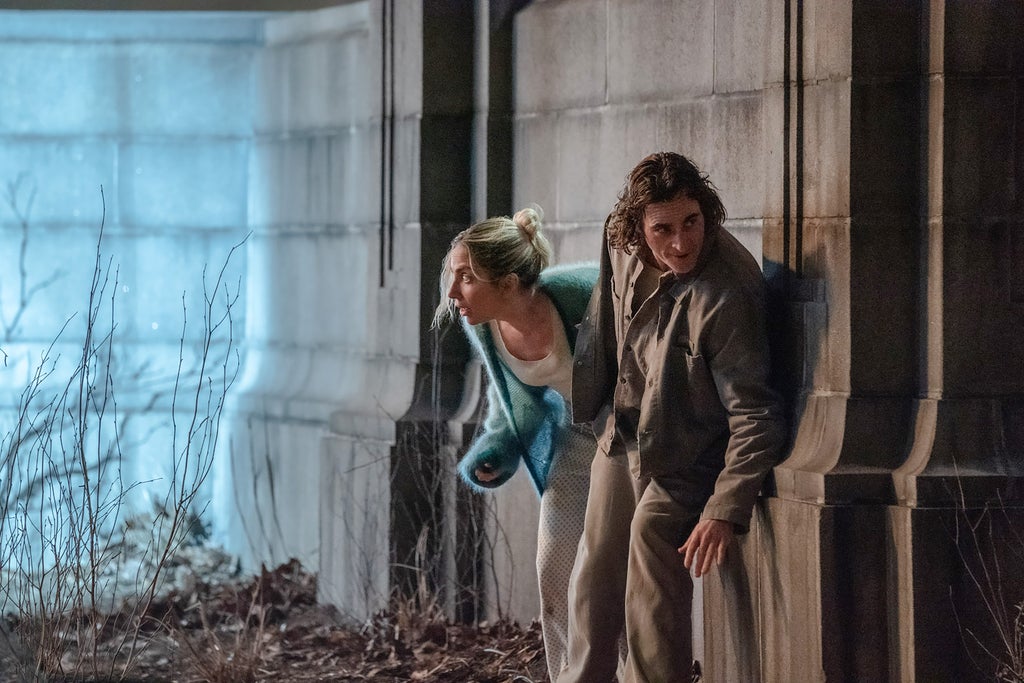
As he awaits trial for mass murder in high-risk block E of the corrupt Gotham psychiatric facility, Arthur ventures into the minimum-security B ward. The world slows down for a moment when he spots Lee outside a music class: Swaddled in an oversized marigold mohair cardigan over her hospital-issue white scrubs, she meets his eye and makes a finger gun gesture to her head.
Like many headline-grabbing mass murderers before him, Arthur’s the subject of a TV movie, which an enamored Lee has watched countless times. “She’s this little street urchin,” says Phillips. “She really made herself small in order to get his attention… This is really a love story, and we wanted to create a vulnerability with her in this institution.”
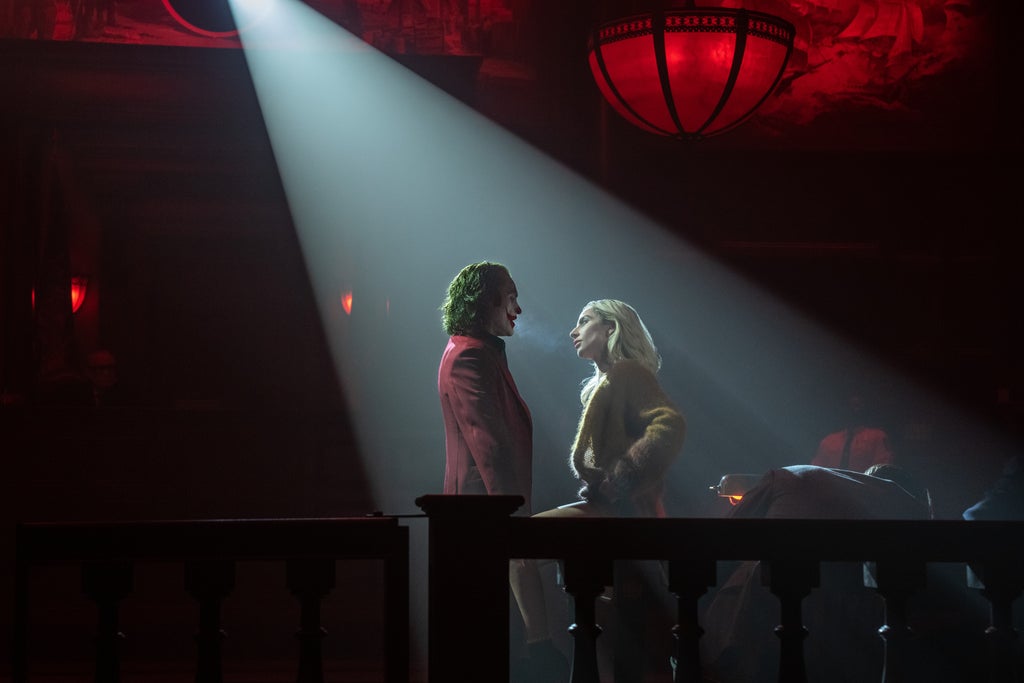
Lee’s “cozy sweaters” — her trusty mustard one, and a two-tone blue cardigan — set a backstory for the character, according to the costume designer: “The idea is that maybe she found it in a thrift store or it belonged to her father.” (For the Superman-level vision-enhanced viewer, Phillips also wove subtle, foreshadowing diamond patterns into both cardis.)
A sweet, dainty bow at the neckline of Lee’s tank and her scruffy ballet slippers (a reference to Amy Winehouse — who sported a visibly worn-in pair on more than one occasion — and director Todd Phillips’ idea) also convey vulnerability. And an origin story.
“There’s a little infantilizing of her in the beginning,” says Phillips. “She has this bravado — a fearlessness that you really experience in a young person — and then you see her as her determination grows over time.”
Lee’s Downtown NYC-Influenced Courtroom Outfits

Out of Arkham, Lee gradually shows her support of (or fixation on?) Arthur and his Joker persona by moving up the gallery to sit front row at his trial. Her courtroom dresses undergo a progression, too, starting with a floaty, light blue floral mini before evolving to a sheer black tunic with velvet diamond shapes and a navy, flower-print “church”-type dress with an exaggerated Peter Pan collar.
“[The early ‘80s] was the time when the East Village scene and CBGB on the Bowery were starting up,” says Phillips about the inspiration for Lee’s supposedly thrifted, ‘70s “babydoll, [designer] Biba-esque dresses” worn with discordant oversize cardigans and chunky punk rock outerwear. “She has a fake fur jacket and a thrift store men’s sweater. She would have cobbled these looks together, but, still, there’s a vulnerability and bizarre innocence — she’s this sycophant who’s obsessed with Joker. That mix, to me, shows that.”
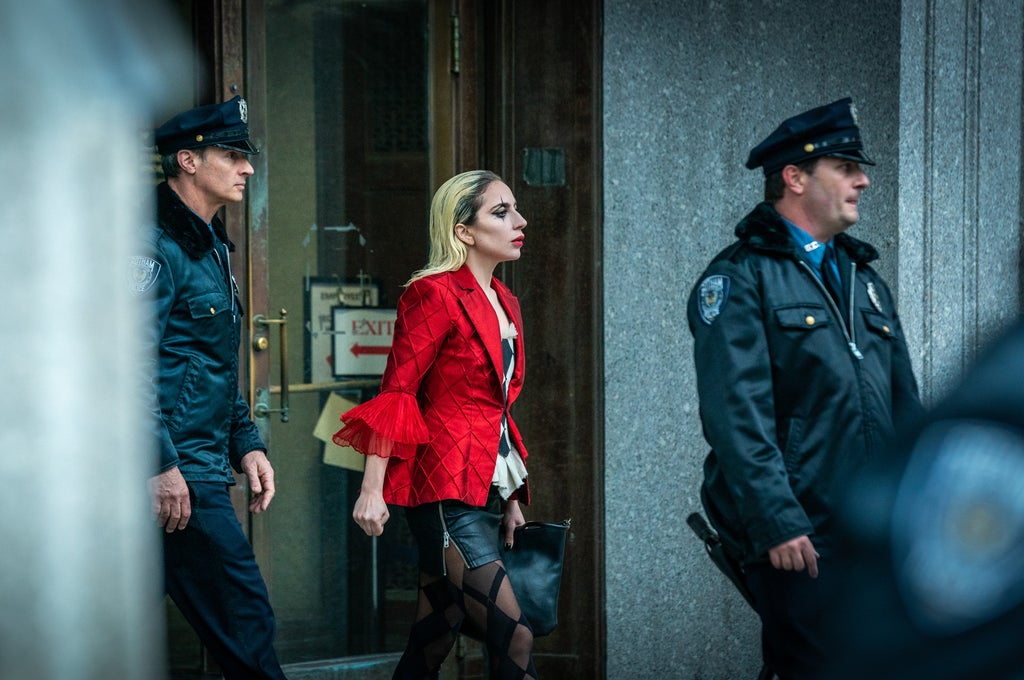
On the final day of Arthur’s trial, Lee strides into court in full Harley Quinn regalia: a red blazer with raised diamond patterns and pleated ruffle cuffs, a theatrical corset and graphic tights.
“Along with [embracing] her determination, she has taken on this persona inspired by Joker,” says Phillips. She imagines that Lee thrifted the red jacket from an old circus uniform, ripped the muslin and ruffle-trimmed corset off a period costume gown, and maybe copped the leather mini from the Gotham outpost of Trash and Vaudeville. “You see the diamond pattern throughout,” she adds.
Lee’s Showstopping Fantasy Looks
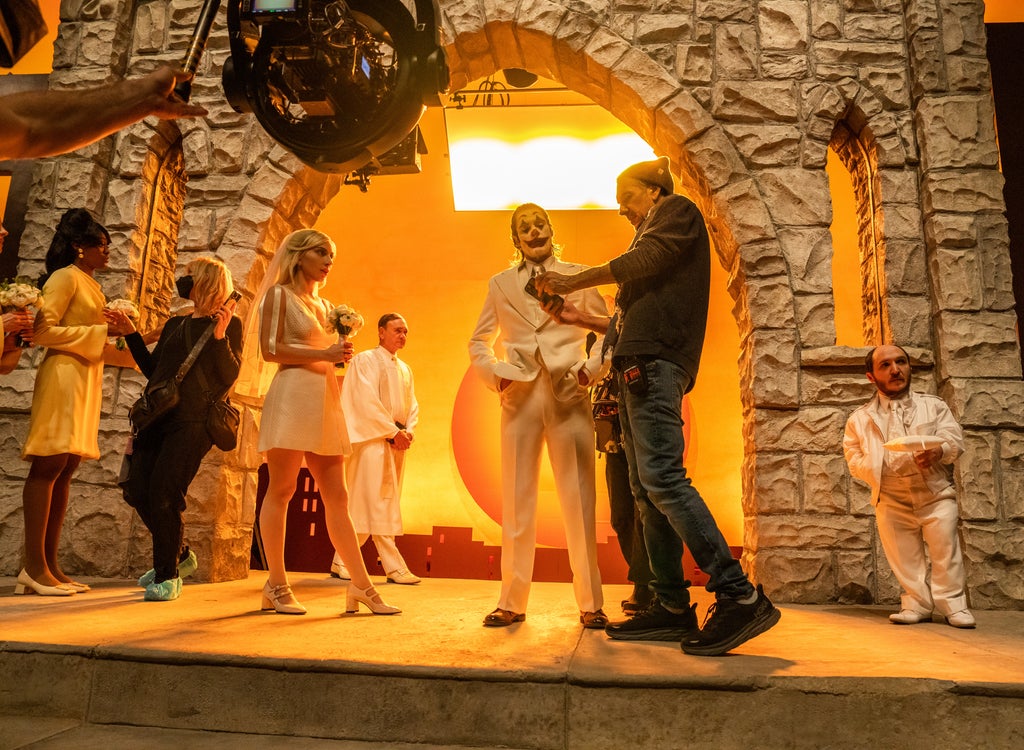
During an extremely tense trial moment, Arthur dissociates into one of his most heightened musical sequences: a wedding.
Lee walks down the aisle toward Joker in a V-neck mini dress with a delicate diamond trapunto pattern and gleaming ribbons streaming down the shoulders — “playing into what Arthur would be attracted to,” says Phillips. “In her fantasy, and his fantasy, what would that look like?”
Phillips referenced ‘60s icons like Jacqueline Kennedy Onassis for the block-heel Mary Janes, plus Doctor Zhivago-era Julie Christie and the late ‘60s/‘70s silhouettes of Ossie Clark and Biba. “[The dress is] pretty inspired by my aunt, who got married in the ‘70s,” she adds. “I was a flower girl.”
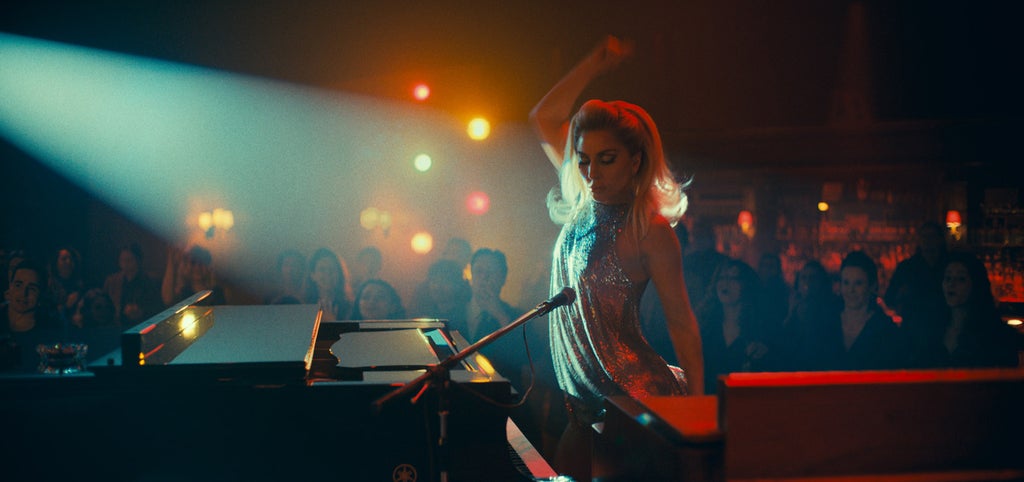
The nuptials transition into a raucous jazz performance at the ill-fated (and ominously named) Pogo’s comedy club. Lee smashes the keys on a baby grand as she belts out a banger, wearing a silver metal mesh dress that sways with her bombastic movements, bringing to mind…well, Lady Gaga.
Phillips — who’s designed six world tours for Madonna — collaborated with Michael Schmidt (a go-to for the likes of Dua Lipa, Sabrina Carpenter and Olivia Rodrigo) on the sparkly stage-wear. “I made a diamond-shaped collar that just gave a certain energy to that scene,” she says.
The costume designer also worked with Lady Gaga’s sister, Natali Germanotta, and her atelier, Topo Studio, which built the white bias-cut gown for a rooftop dance number straight out of a silver screen classic.
“Totally Ginger Rogers and Fred Astaire,” says Phillips, “and [the dress inspiration] was in the script, so I leaned into that.”
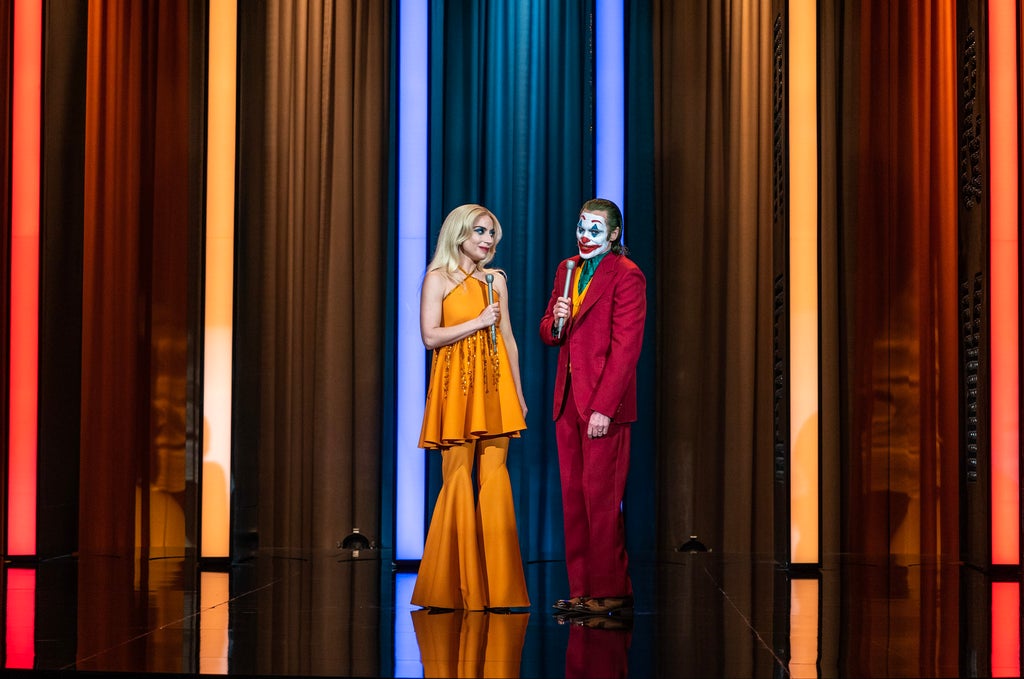
She also sketched and designed the sleek, fluid gown to allow for Gaga and Phoenix’s upbeat choreography. For another bit, a striking marigold two-piece set with a smattering of delicate beading references Bob Mackie’s work for Cher.
“The beauty of this movie is that there’s so much realism,” she says, “yet we get to be in Arthur’s mind, where we blur reality and fantasy.”
Joker: Folie à Deux is out in theaters on October 4.
Like what you see? How about some more R29 goodness, right here?
Beetlejuice Beetlejuice Features Goth Fashion
Lady Gaga On Makeup, Aging, & Her New Concealer
Emily in Paris Fashion Is Inspired By Pretty Woman







